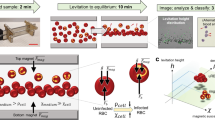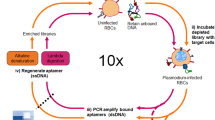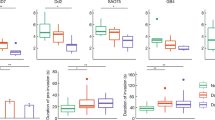Abstract
Malaria research often requires isolation of individually infected red blood cells (RBCs) or of a homogenous parasite population derived from a single parasite (clone). Traditionally, isolation of individual, parasitized RBCs or parasite cloning is achieved by limiting dilution or micromanipulation. This protocol describes a method for more efficient cloning of the malaria parasite; the method uses a cell sorter to rapidly isolate Plasmodium falciparum–infected RBCs singly. By gating the parameters of forward-angle light scatter and side-angle light scatter in a cell sorter, singly infected RBCs can be isolated and automatically deposited into a 96-well culture plate within 1 min. Including a Percoll purification step; the entire procedure to seed a 96-well plate with singly infected RBCs can take <40 min. This highly efficient single-cell sorting protocol should be useful for cloning of both laboratory parasite populations from genetic manipulation experiments and clinical samples.
This is a preview of subscription content, access via your institution
Access options
Subscribe to this journal
Receive 12 print issues and online access
$259.00 per year
only $21.58 per issue
Buy this article
- Purchase on Springer Link
- Instant access to full article PDF
Prices may be subject to local taxes which are calculated during checkout



Similar content being viewed by others
References
Chen, Q. et al. Identification of Plasmodium falciparum erythrocyte membrane protein 1 (PfEMP1) as the rosetting ligand of the malaria parasite P. falciparum. J. Exp. Med. 187, 15–23 (1998).
Fernandez-Becerra, C. et al. Variant proteins of Plasmodium vivax are not clonally expressed in natural infections. Mol. Microbiol. 58, 648–658 (2005).
Liu, S., Mu, J., Jiang, H. & Su, X.Z. Effects of Plasmodium falciparum mixed infections on in vitro antimalarial drug tests and genotyping. Am. J. Trop. Med. Hyg. 79, 178–184 (2008).
Zhong, D. et al. Plasmodium falciparum genetic diversity in western Kenya highlands. Am. J. Trop. Med. Hyg. 77, 1043–1050 (2007).
Rosario, V. Cloning of naturally occurring mixed infections of malaria parasites. Science 212, 1037–1038 (1981).
Tarun, A.S. et al. Quantitative isolation and in vivo imaging of malaria parasite liver stages. Int. J. Parasitol. 36, 1283–1293 (2006).
Tarun, A.S. et al. A combined transcriptome and proteome survey of malaria parasite liver stages. Proc. Natl. Acad. Sci. USA 105, 305–310 (2008).
Khan, S.M. et al. Proteome analysis of separated male and female gametocytes reveals novel sex-specific Plasmodium biology. Cell 121, 675–687 (2005).
Janse, C.J., Franke-Fayard, B. & Waters, A.P. Selection by flow-sorting of genetically transformed, GFP-expressing blood stages of the rodent malaria parasite, Plasmodium berghei. Nat. Protoc. 1, 614–623 (2006).
Miao, J., Li, X. & Cui, L. Cloning of Plasmodium falciparum by single-cell sorting. Exp. Parasitol. 126, 198–202 (2010).
Trager, W. & Jenson, J.B. Cultivation of malarial parasites. Nature 273, 621–622 (1978).
Lambros, C. & Vanderberg, J.P. Synchronization of Plasmodium falciparum erythrocytic stages in culture. J. Parasitol. 65, 418–420 (1979).
Acknowledgements
We thank the National Institute of Allergy and Infectious Diseases, National Institutes of Health (R01AI064553 and U19AI089672) for financial support.
Author information
Authors and Affiliations
Contributions
J.M. designed and performed the experiments, analyzed the data and wrote the paper; L.C. supervised the project and wrote the paper.
Corresponding authors
Ethics declarations
Competing interests
The authors declare no competing financial interests.
Rights and permissions
About this article
Cite this article
Miao, J., Cui, L. Rapid isolation of single malaria parasite–infected red blood cells by cell sorting. Nat Protoc 6, 140–146 (2011). https://doi.org/10.1038/nprot.2010.185
Published:
Issue Date:
DOI: https://doi.org/10.1038/nprot.2010.185
This article is cited by
-
Extracellular vesicles could be a putative posttranscriptional regulatory mechanism that shapes intracellular RNA levels in Plasmodium falciparum
Nature Communications (2023)
-
A type II protein arginine methyltransferase regulates merozoite invasion in Plasmodium falciparum
Communications Biology (2023)
-
Development of Plasmodium falciparum liver-stages in hepatocytes derived from human fetal liver organoid cultures
Nature Communications (2023)
-
Performance of coumarin-derived dendrimer-based fluorescence-linked immunosorbent assay (FLISA) to detect malaria antigen
Malaria Journal (2014)
-
An alternative protocol for Plasmodium falciparum culture synchronization and a new method for synchrony confirmation
Malaria Journal (2013)
Comments
By submitting a comment you agree to abide by our Terms and Community Guidelines. If you find something abusive or that does not comply with our terms or guidelines please flag it as inappropriate.



